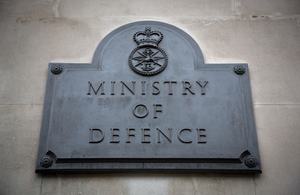Statutory Instrument on Royal Navy Police enforcement powers
A Regulation has been introduced to the Policing and Crime Act 2017 to provide Royal Navy Police with enforcement powers as the transition period for Britain's exit from the EU comes to an end.

The Ministry of Defence has laid a Statutory Instrument in Parliament to introduce a Regulation under the Policing and Crime Act 2017. This will provide Royal Navy Police with additional law enforcement powers as the transition period for Britain’s exit from the EU comes to an end. Additional powers would come into effect on Thursday 07 January 2021 and will apply to England and Wales territorial waters only.
The Government is determined to ensure the security of UK waters from a range of threats under all circumstances. Contingency work for the end of the EU Transition Period has identified that there may be an operational requirement to extend law enforcement powers to Royal Navy Police.
Royal Navy personnel already routinely conduct enforcement activity in UK waters and Royal Navy Police are specially trained to conduct a range of enforcement activity safely and in line with civilian policing procedures. Currently, any interventions at sea are joint operations between the police and military. However, the deployment of civilian police officers to a maritime incident may be impractical in some circumstances. Providing extra powers will give greater flexibility to authorities to act effectively.
Royal Navy Police will only use these powers if requested to do so by civilian police forces. No decisions on the use of enforcement will be taken independently by military personnel, and the new powers are only extended to Royal Navy Police, a specific branch of the Royal Navy with trained military police officers.
The extension of enforcement powers to Royal Navy Police will be reviewed in six months.